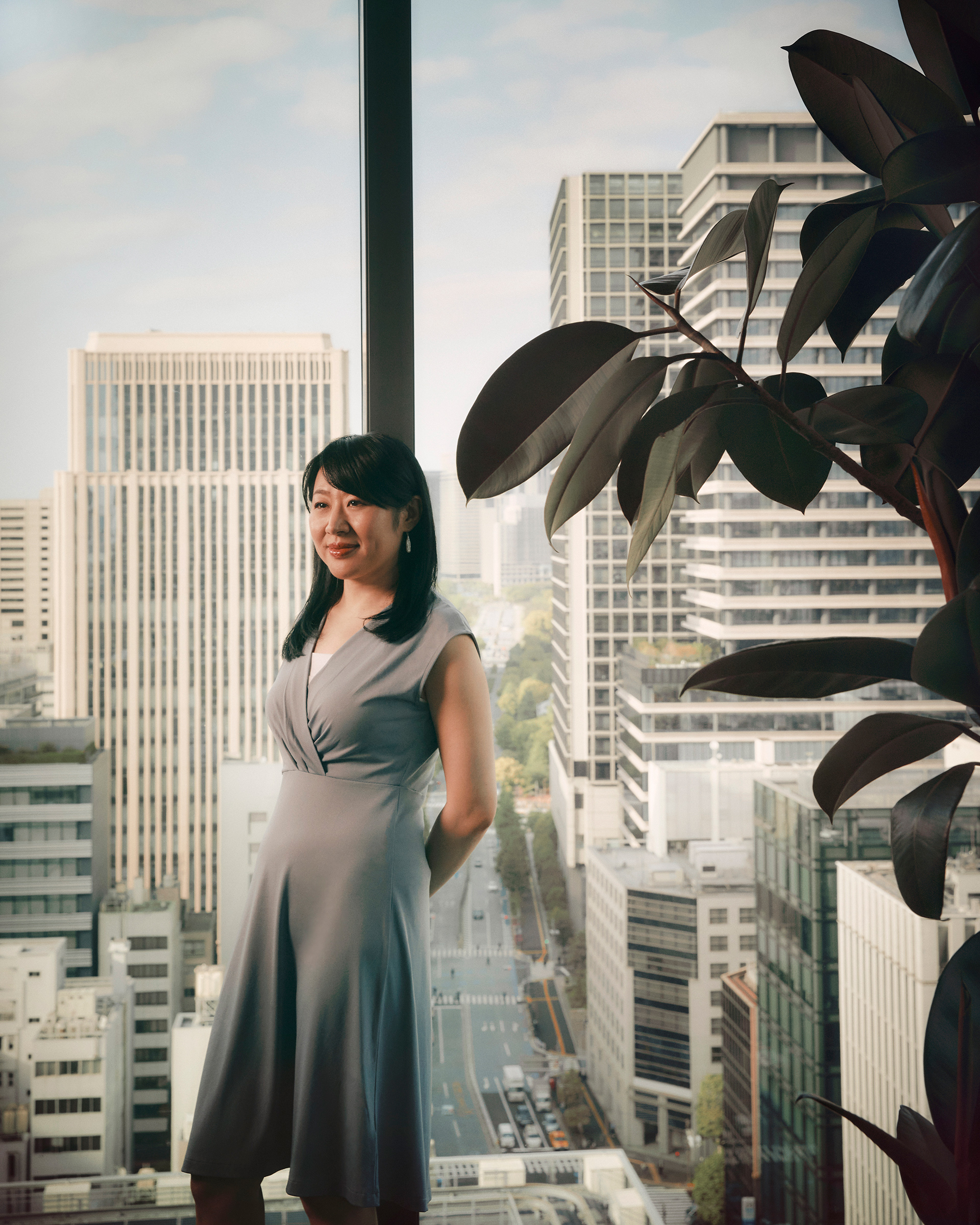Naomi Koshi remembers handing out flyers outside a train station during her second mayoral campaign in 2016, when an older man walked up to her and said, “You are too strong for a woman,” and kicked her. She was shocked; she’d already spent four years serving as Japan’s youngest female mayor—one of just a few female mayors in the country—and ultimately won her second term. “I felt that sometimes people hate strong women,” she says, reflecting on a cultural dynamic that, by holding back half of its population, also holds back Japan. Koshi was determined to help change it.
Japan is one of the world’s richest, most advanced societies; it’s the third largest economy, beating out countries with much larger populations. But its own population is shrinking, and the nation’s economic growth has been stagnant. Household income is down. Fumio Kishida, who became Prime Minister in late 2021, has promised to usher in an era of “new capitalism” to drive faster economic growth and higher wages, but it’s not yet clear how he will address what Koshi believes to be the linchpin of the problem: Japanese women are woefully underrepresented in business.
Koshi, a lawyer who now sits on the boards of two companies, has seen this firsthand. Only 8% of company board members are women, and they hold less than 15% of managerial roles—one of the lowest rates among the world’s large economies. (In the U.S., about 30% of S&P 500 board directors are women.) The country is ranked 120 of 156 nations in the World Economic Forum’s Global Gender Gap Index. An April 2019 Goldman Sachs report found that closing the gender employment gap could lift Japan’s GDP by 10%, and if women’s working hours rose to the average of the Organisation for Economic Cooperation and Development, the boost might be as big as 15%. Now Japan’s main business association, the Keidanren, has called for 30% of board members and corporate executives to be women by 2030.

“One of the reasons Japanese companies, the Japanese economy, hasn’t been good for 30 years is [the] decisionmaking process. They’ve been doing the same thing for 30 years,” Koshi says. “We need different viewpoints. Not only women, but also young people, foreigners, LGBTQ people. The important thing is to diversify the people making decisions.”
So last year, with fellow lawyer Kaoru Matsuzawa, Koshi founded OnBoard, a company that trains and places women in corporate board positions across Japan, with a focus on companies that plan to IPO soon. Her first seminar drew more than 65 attendees, and she says OnBoard has now trained more than 230 women. But to meet the Keidanren goal, Koshi says, Japan will need about 9,000 new female directors within the decade. In a 2021 podcast interview, she didn’t mince words: “I have to work very hard.”
Read More: How Artificial Intelligence Can Help Us Achieve Gender Equality
Koshi’s work on gender equality began more than a decade ago. After attending Harvard Law School, she worked as an attorney in New York, where she began noticing the different ways women in business were treated. She was shocked when a male colleague told her he was planning to take paternity leave, and it made her wonder why women in Japan often had to decide between having children or careers. (Environment Minister Shinjiro Koizumi’s decision to take a 12-day paternity leave in 2020 made headlines in Japan.)
Japanese men do fewer hours of domestic work than those in any other wealthy nation, and a culture of long workdays means Japanese women are often forced to leave their careers when they have children. The cultural sentiment was underscored last year when the head of the Tokyo Olympics organizing committee said women talk too much in meetings. (“If we increase the number of female board members, we have to make sure their speaking time is restricted somewhat; they have difficulty finishing, which is annoying,” Yoshiro Mori reportedly said.) In 2018, top ruling party politician Koichi Hagiuda said raising infants and toddlers is a job for mothers. He’s now the Minister of Economy, Trade, and Industry.
Although Koshi herself did not marry or have children, and did not have to make this choice herself—“I could work the same as a man, so I didn’t feel any discrimination,” she says—she decided to run for mayor of her hometown to try to enact change for others. In 2012, the then 36-year-old was elected Otsu City’s mayor, at a time when barely any in the country were women. In her two terms, she built dozens of nurseries to give Otsu women more childcare options.
Koshi has always stood out. She recalls speaking up a lot in class as a child—something that is uncommon in the country. “There’s a popular saying in Japan: ‘The nail that sticks out gets hammered down.’ In Japan, doing things differently than others is a bad thing,” she says. “I just did what I really wanted to do, and I didn’t compare myself to other people.”
It wasn’t always easy, and she was bullied in school. Perhaps it prepared her for the difficulties to come. Once, while she was trying to convince her subordinates—mostly men in their late 50s— to adopt her childcare policies, one colleague got so mad that he shouted, punched the desk, and left the room. “At the time, I thought they were mad because I was a young woman and the previous mayors were old men,” she says. “But now I realize that it was because I had a different viewpoint.”

For the more than 340,000 residents of Otsu City, though, that viewpoint was invaluable. Ayako Toshinaga, a lawyer, moved to Otsu City from the neighboring city Kusatsu in 2015 be- cause she couldn’t find a nursery for her baby in Kusatsu. “I love my job, so I wanted to go back to work,” Toshinaga says.
A weekly newsletter featuring conversations with the world’s top CEOs, managers, and founders. Join the Leadership Brief
OnBoard launched at an inflection point for corporate gender equality. In 2020, feeling that she’d accomplished her goals as mayor, Koshi declined to run for a third term and took a position practicing corporate law at Miura & Partners. A year later, the Tokyo Stock Exchange (TSE) updated its corporate governance code to encourage Japan’s companies to improve diversity, and bring Japan more in line with global standards, with the hope that it would make Japanese companies more attractive to foreign investors. (Since March 2022, Goldman Sachs Asset Management has opposed Japanese companies’ proposals to elect directors if at least 10% of their directors aren’t already women.)
A reorganization of the TSE in April 2022 required companies listed in its top tier to have at least one-third of its board members be independent directors. Recent years have also seen increasing focus on ESG (environmental, social, and governance) investing.
In a speech in March to mark International Women’s Day, Japan’s minister of gender equality, Seiko Noda, one of Japan’s most prominent female politicians, acknowledged Japan’s gender equality issues and called for the country to make improvements at “an unprecedented speed.” She said the government will “do its utmost” to achieve goals set out in its Fifth Basic Plan for Gender Equality, which calls for raising the proportion of women in leadership positions to about 30% of the total “as early as possible during the 2020s.”
But though empowering women is an obvious way to improve the nation’s productivity, “there hasn’t been the level of focus on gender diversity as much as prior administrations,” says Kathy Matsui, one of three women who run MPower Partners, Japan’s first venture-capital fund focused on ESG investing. Matsui is credited with coming up with former Prime Minister Shinzo Abe’s “Womenomics” policies during her time at Goldman Sachs. While a government goal to increase the proportion of women in leadership positions remains in place, “there has not been much discussion about exactly what needs to change for that target to be reached,” Matsui says.
OnBoard is not the first or only company working to improve board diversity in Japan. For example, the investment firm Oasis and the Board Director Training Institute of Japan announced in March a new initiative to sponsor board director training courses for women. But Matsui says OnBoard’s work is vital. “The common excuse many companies give for why they can’t increase diversity is because they say, ‘There are not enough qualified women.’ And so I think through [Koshi’s] efforts, through other organizations’ efforts, to identify qualified candidates—or, frankly, if they’re not qualified, to train them … every effort in that direction is a positive step.”
Koshi herself sits on the boards of SoftBank Corp. and the telecommunications company V-cube Inc. So far, OnBoard has introduced 160 candidates to 29 companies. The plan for 2022 is to introduce over 500 more, and put around 30 on corporate boards. Not everyone introduced is appointed, but corporate lawyer Aya Nomura is among those who were. The 44-year-old, who lives in Tokyo and has two children, ages 6 and 11, says that she often attended shareholder meetings as a lawyer, and what she saw upset her. There were often “just a bunch of men standing on a stage and meeting shareholders; there are pretty much no women.” Although she was struggling at work at the time, she’d never considered a move into corporate governance. “In relation to my career, I felt that being an outside board member was a very risky job, with a lot of legal responsibility,” Nomura says. She found OnBoard while searching online, and attended several seminars, including one in which female board members talked about their experiences. They’d also felt overwhelmed and alone in corporate Japan at times, and shared advice on how to navigate it. “One of the teachers said, ‘Not taking risks is a risk itself,’ which was an eye-opener for me,” says Nomura.
After her OnBoard training, Nomura was matched and appointed as an outside director to an entertainment company, a role she started in late April. It’s turned out to be a great fit. “Outside directors are not expected to contribute to a company by the length of time they spend in office, but expected to come up with certain results. So I feel that outside boards are actually good job opportunities for those who are mothers, because working mothers are always seeking to make the most out of the limited time we have every day,” she says. “I read articles and research papers in my spare time, and take online courses from home. Recently, I was listening to an e-learning course at double the speed while I was watching my kid’s soccer game.”
The two face different challenges, but Koshi is a role model for Nomura. “I imagine becoming so successful like her; she’s a very impressive woman,” she says of Koshi. “I’m really glad that a person like her is leading the way for women in Japan.”
—With reporting by Mayako Shibata/Tokyo and Eloise Barry/London
More Must-Reads from TIME
- Donald Trump Is TIME's 2024 Person of the Year
- Why We Chose Trump as Person of the Year
- Is Intermittent Fasting Good or Bad for You?
- The 100 Must-Read Books of 2024
- The 20 Best Christmas TV Episodes
- Column: If Optimism Feels Ridiculous Now, Try Hope
- The Future of Climate Action Is Trade Policy
- Merle Bombardieri Is Helping People Make the Baby Decision
Write to Amy Gunia at amy.gunia@time.com